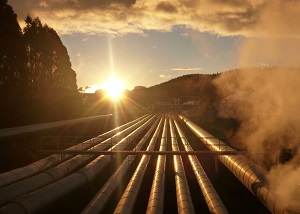
Geothermal energy could play a significant role in ensuring access to affordable, reliable, sustainable and modern energy for all, but production today is only at 7% of the estimated global potential. Geothermal energy exists in almost 90 countries, but only 24 of them produce electricity from geothermal sources. In 2011 the International Energy Agency (IEA) produced a Technology Roadmap for Geothermal Heat and Power that showed that the world could increase production of heat and electricity from geothermal energy at least 10-fold by 2050. Geothermal energy’s potential as a viable energy option with global scale has been constrained to date by a lack of clear global assessment guidelines and standards.
Now, however, a globally-applicable, harmonized standard for reporting geothermal resources has become operational. At its 25th session on 30 September 2016, the UNECE Committee on Sustainable Energy approved the Specifications for Application of the United Nations Framework for Fossil Energy and Mineral Reserves and Resources 2009 (UNFC) to Geothermal Energy Resources.
The Director of the Sustainable Energy Division of UNECE, Scott Foster, noted “The 2030 Agenda for Sustainable Development has just celebrated its first anniversary. Application of UNFC to renewable energy resources is a priority for our member States, and inclusion of geothermal energy in UNFC will help to attain Sustainable Development Goal #7 by improving the positioning of geothermal within the policy and investment communities.”
Having an international system and a standardized terminology for reporting geothermal resources will build trust and understanding of the geothermal industry with investors, regulators and the general public alike. The work to develop the UNFC geothermal specifications was carried out under UNECE’s Memorandum of Understanding with the International Geothermal Association (IGA). UNFC is applicable to all extractive activities, renewable energy and injection projects.
The President of IGA, Juliet Newson, stated “The IGA aims to encourage, facilitate and, when appropriate, promote the coordination of activities related to worldwide research, development and application of geothermal resources. In a manner consistent with the aim of the IGA, and led by Professor Gioia Falcone, the UNFC Geothermal Working Group of the IGA Resources and Reserves Committee has now produced a set of Specifications for classifying, comparing and reporting estimates of geothermal potential, resources and reserves. The Specifications will now be maintained through regular review, through a transparent governance structure, and process, that allows input from all stakeholders. On behalf of the IGA, I thank Professor Falcone, and all stakeholders and collaborators involved in the development of the Specifications. In particular, I want to extend our thanks to the Chair of the IGA Resources and Reserves Committee, Dr. Graeme Beardsmore, for his dedication and hard work.”
Achieving a successful sustainable development agenda requires partnerships between governments, the private sector and civil society, as called for in SDG17 “Revitalize the global partnership for sustainable development”. Professor Gioia Falcone underlined “This work has only been possible due to productive partnerships with all stakeholders. In particular, the collaboration with IGA as the international geothermal umbrella has proven to be of strategic relevance, allowing for a high degree of interaction and engagement with the World Bank-ESMAP, IRENA, IEA-GIA, US DOE, GEA, GRC, EGEC, UGI, and more. After only 20 months from the appointment of a 12-person Working Group of volunteers to draft the geothermal specifications from scratch, we are pleased to see them becoming operational.”
For further information about UNECE, UNFC and IGA, please consult the respective websites: http://www.unece.org, http://www.unece.org/ie/se/reserves.html and http://www.geothermal-energy.org.
Note to editors:
The United Nations Framework for Fossil Energy and Mineral Reserves and Resources 2009 (UNFC), which is applicable to all extractive activities worldwide and now also renewable energy and injection projects, is developed by the UNECE Expert Group on Resource Classification. The IGA is represented in the Expert Group and its Bureau. The Expert Group provides a forum for stakeholders, including governments, industry, the financial reporting sector, international organizations and professional societies and associations, to assist in defining the needs to be met by the classification, its definitions, specifications and guidelines, and a vehicle for recommending their application.
The work on application of UNFC to renewable energy resources is undertaken by a dedicated Task Force of the Expert Group. The Task Force has developed generic specifications for applying UNFC to renewables and is now focusing on the development of renewable commodity-specific specifications, including for bioenergy, hydropower, solar and wind.
The International Geothermal Association (IGA), founded in 1988, is a scientific, educational and cultural organization established to operate worldwide. It has more than 5,200 members in over 65 countries. The IGA is a non-political, non-profit, non-governmental organization. The objectives of the IGA are to encourage research, the development and utilization of geothermal resources worldwide through the publication of scientific and technical information among the geothermal specialists, the business community, governmental representatives, UN organizations, civil society and the general public.
Annex
Installed Geothermal Generating Capacity, 1990–2015
Bertani, R., 2015. Geothermal Power Generation in the World 2010-2014 Update Report. Proceedings World Geothermal Congress 2015, Melbourne Australia, 19–25 April 2015.

